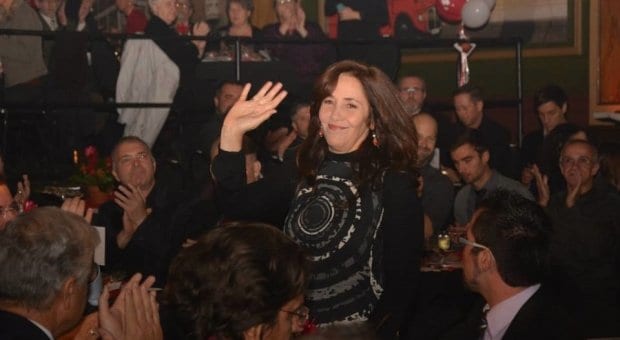Mariela Castro, the daughter of Cuban President Raul Castro and the niece of former president Fidel Castro, was in Montreal recently to accept an award for her work promoting the civil rights of LGBT people in Cuba.
Castro received a warm standing ovation at Montreal’s sold-out Corona Theatre at the 10th annual Gala Arc-en-Ciel, the awards ceremony honouring LGBT activists and presented by the Conseil Québécois LGBT each October. Previous winners of the gala’s international Grand Prix award include Svend Robinson, Louise Arbour and South African Supreme Court Justice Edwin Cameron.
“I am honoured to receive this award, which I dedicate to my mother, feminist and revolutionary Vilma Espín, who, since the first years of the Cuban Revolution, defended the rights of historically marginalized social groups in colonial and neo-colonial-dominated Cuba,” Castro told Xtra. “I also accept this prize as recognition of the work of those working with me, who have greatly contributed to our work at the Cuban National Center for Sex Education (CENESEX).”
Castro is a sexologist and the director of CENESEX. Since 2004 she has been the driving force lobbying for healthcare for transsexuals in Cuba and in 2008 won approval from the public health ministry to offer free sex-reassignment operations to Cubans. Castro is also president of the Cuban Multidisciplinary Centre for the Study of Sexuality, president of the National Commission for Treatment of Disturbances of Gender Identity, member of the Direct Action Group for Preventing, Confronting and Combating AIDS, and an executive member of the World Association for Sexual Health.
Along the way she has publicly advocated for same-sex unions in Cuba, and her organization CENESEX has given sensitivity training to Cuban police and continues to campaign for effective HIV/AIDS prevention.
“Just because someone is not heterosexual does not make them any less human,” she says. “They have all the same rights that I do, and I will continue to fight for their right to get married. The problem in Cuba is the same problem you have in other countries, and that is religion. And in Cuba, that is mainly Catholicism.”
But Castro points to a transgender politician who was elected this past February as a deputy in Cuba’s parliament, the National Assembly of People’s Power.
“Her name is Adele, and she had widespread support,” she says. “That is a sign that things are improving in Cuba.”
This past May, Castro also received an award from the Equality Forum, an international LGBT think-tank based in Philadelphia. The US State Department initially refused to grant Castro clearance to travel from New York, where she was visiting the United Nations. But the decision was reversed at the last minute, and Castro travelled to Philadelphia to receive her award.
Unlike in Montreal, whose citizens have travelled to and vacationed in Cuba for decades, controversy followed Castro to Philadelphia. In a 2013 report, Human Rights Watch states that Cuba “remains the only country in Latin America that represses virtually all forms of political dissent” and in 2012 “continued to enforce political conformity using short-term detentions, beatings, public acts of repudiation, travel restrictions, and forced exile.”
While Castro’s language echoes anti-colonial rhetoric, not even her cousin Alina Fernandez — the daughter of Fidel Castro who escaped Cuba in 1993 with false papers and is currently a popular radio talk-show host in Miami — doubts Mariela’s sincerity and good intentions.
“She’s sensitive and courageous, helping those who have historically been persecuted in Cuba,” Fernandez told this reporter a couple of years ago. “At the beginning of the revolution, many writers and artists were accused of being homosexuals and were sent to UMAP camps [Unidades Militares de Ayuda a la Producción, or Military Units to Aid Production, established in 1965 to eliminate alleged “bourgeois” and “counterrevolutionary” values in Cuba]. I respect Mariela because she could have done anything else.”
When I repeat Alina’s quote to Mariela — as well as Alina’s assertion that Mariela’s father, Raul Castro, “was always good to [Alina’s] family, whereas Fidel was indifferent” — she asks to clarify what happened in Cuba’s old UMAP camps.
“There were no discussions of homosexuality at that time, when we were under threat from American state terrorism,” Castro says. “So Cuba had a statewide crackdown, and some homosexual people were also [arrested]. But after three years, we stopped arresting homosexuals because of the homophobic attitudes and reactions [of other prisoners] in the units.”
That surely is of little consolation to LGBT victims of past state persecution in Cuba, but Castro is clearly unafraid to challenge the establishment. So I ask her if the establishment is afraid of challenging the daughter of Raul Castro? What was it like growing up as a Castro?
Castro pauses for a moment, then says, “To have parents as well-known as mine, sometimes it bothered me because it caused some problems. But otherwise my childhood was normal. Growing up is difficult for everybody.”
Read more about gay life in Cuba.


 Why you can trust Xtra
Why you can trust Xtra


